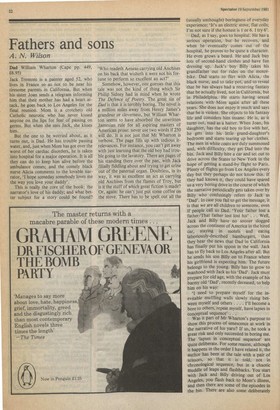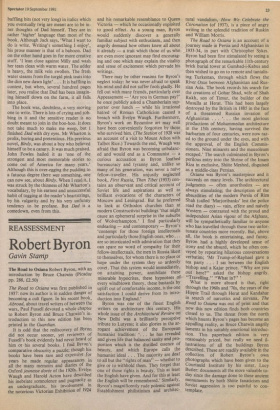Fathers and sons
A. N. Wilson
Dad William Wharton (Cape pp. 449, £6.95) Jack Tremont is a painter aged 52, who lives in France so as not to be near his tiresome parents in California. But when his sister Joan sends a telegram informing him that their mother has had a heart attack, he goes back to Los Angeles for the final reunion. Mom is a crotchety old Catholic neurotic who has never kissed anyone on the lips for fear of passing on germs. But when she sees Jack, she kisses him.
But the one to be worried about, as it turns out, is Dad. He has trouble passing water, and, just when Mom has got over the worst of her cardiac disorders, he is taken into hospital for a major operation. It is all they can do to keep him alive before the ambulance comes; and the comely black nurse Alicia comments to the lovable narrator, `I hope someday somebody loves me the way you love your daddy'.
This is really the core of the book: the narrator's love of his daddy; and what better subject for a story could be found? 'Who readeth Aeneas carrying old Anchises on his back that wisheth it were not his fortune to perform so excellent an act?'
Somehow, however, one guesses that this tale was not the kind of thing which Sir Philip Sidney had in mind when he wrote The Defence of Poetry. The great sin of Dad is that it is terribly boring. The novel is a million miles away from Henry James's grandeur or cleverness, but William Wharton seems to have absorbed the unwritten Jamesian rule for all aspiring masters of American prose: never use two words if 250 will do. It is not just that Mr Wharton is verbose. The page fills up with tedious irrelevances. For instance, you can't get away with just learning that the old boy had trouble going to the lavatory. There are pages of his standing there over the pan, with Jack filially fiddling about and trying to get urine out of the paternal organ. Doubtless, in its way, it was as excellent an act as carrying old Anchises from the flames of Troy, but is it the stuff of which great fiction is made? Or, again: he can't just put some coffee on the stove. There has to be spelt out all the (usually unthought) boringness of everyday experience: 'It's an electric stove, flat coils; I'm not sure if the hottest is 1 or 6. I try 6'.
Dad, as I say, goes to hospital. He has a serious operation, but he recovers, and when he eventually comes out of the hospital, he proves to be quite a character. He even grows a beard. He and Jack buy lots of second-hand clothes and have fun dressing up. Jack's boy Billy takes his grandfather out for rides on the motorbike. Dad starts to flirt with Alicia, the black nurse, and to take pot, and to reveal that he has always had a recurring fantasy that he actually lived, not in California, but in Philadelphia. He starts having sexual relations with Mom again after all these years. She does not enjoy it much and says that he is violent. She objects to his fantasy life and considers him insane. He is, as it turns out, mad as a hatter. When Joan, his daughter, has the old boy to live with her, he gets into his little grand-daughter's bedroom and starts tearing up her clothes. The men in white coats are duly summoned and, with difficulty, they get Dad into the bin. Jack and Billy hire a car and set out to drive across the States to New York in the hope of getting a stand-by flight to Paris. Plenty of flights go from Los Angeles every day but they perhaps do not know this. If they had known it, they could have spared us a very boring drive in the course of which the narrative periodically gets taken over by Billy who confusingly refers to Jack as 'Dad'. In case you fail to get the message, it is that we are all children to someone, even if people call us Dad. 'Your father lost a father/That father lost lost his' . . . Well, Jack and Billy have no sooner slogged across the continent of America in the hired car, staying in motels and eating laboriously-described hamburgers, than they hear the news that Dad in California has finally put his spoon in the wall. Jack has to fly back to Los Angeles after all. But he sends his son Billy on to France where his girlfriend is expecting him. The future belongs to the young. Billy has to grow to manhood with Jack as his `Dad'. Jack must prepare for old age, with the example of his barmy old `Dad', recently deceased, to help him on his way: 'I need to prepare myself for the inevitable muffling walls slowly rising between myself and others . . . . I'll become a bore to others, repeat myself, have lapses in conceptual sequence' . .
Was it part of Mr Wharton's purpose to show this process of senescence at work in the narrative of his yarn? If so, he took a great risk and only succeeded in boring me. The `lapses in conceptual sequence' are quite deliberate. For some reason, although it happens in the order I have related it, the author has been at the tale with a pair of scissors, so that it is told, not in chronological sequence, but in a chaotic muddle of leaps and flashbacks. You start with Jack and Billy driving out of Los Angeles, you flash back to Mom's illness, and then there are some of the episodes in the bin. There are also some deliberately baffling bits (not very long) in italics which you eventually twig are meant are to be inner thoughts of Dad himself. They are in rather 'higher' language than most of the book. Although Jack says, 'What I want to do is write. Writing's something I enjoy', his prose manner is that of a baboon. Dad on the other hand goes in for more creative stuff. 'I lean close against Milly and wash her teats clean with warm water. The udder is heavy, the milk vein swollen. The fresh water steams from the turgid pink teats into the dim new dawn light'. . . It is baffling in context, but when, several hundred pages later, you realise that Dad has been imagining himself down on the farm, it all falls into place.
The book was, doubtless, a very moving one to write. There is lots of crying and sobbing in it and the sensitive reader is no doubt meant to join in the boo-hoo. It does not take much to make me weep, but I finished Dad with dry eyes. Mr Wharton is prolix, boring and pretentious. His previous novel, Birdy, was about a boy who believed himself to be a canary. It was much praised. John Fowles hailed it as 'one of the strongest and most memorable stories to come out of America for many years.' Although this is over-egging the pudding to a fatuous degree there was something, one can now see, about Birdy. When I read it, I was struck by the thinness of Mr Wharton's vocabulary, by his earnest and unsuccessful habit of tugging at the reader's heartstrings, by his vulgarity and by his very unfunny tendency to be profane. But Dad is a comedown, even from this.



































 Previous page
Previous page